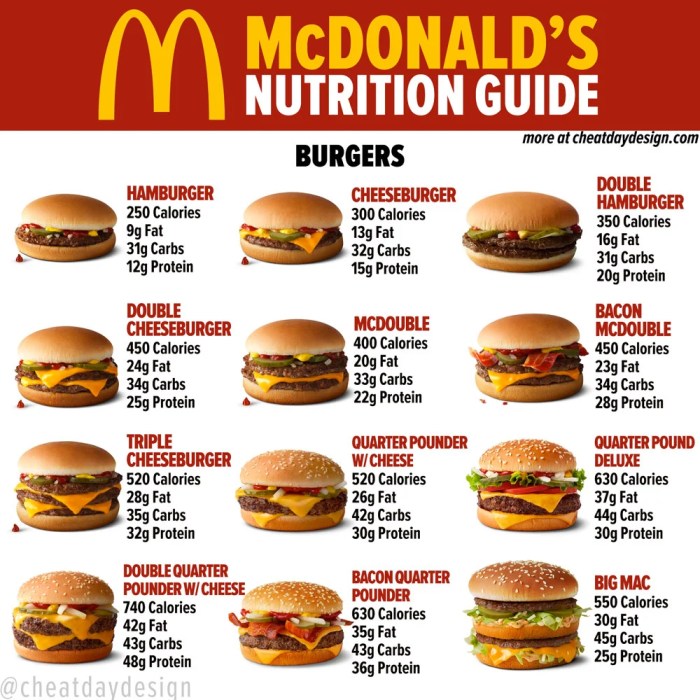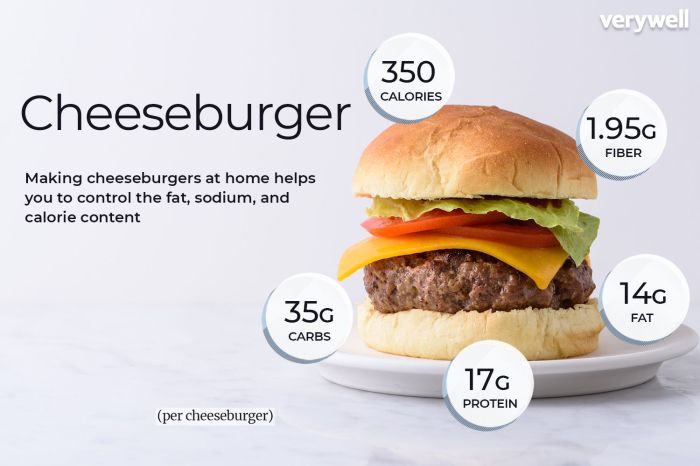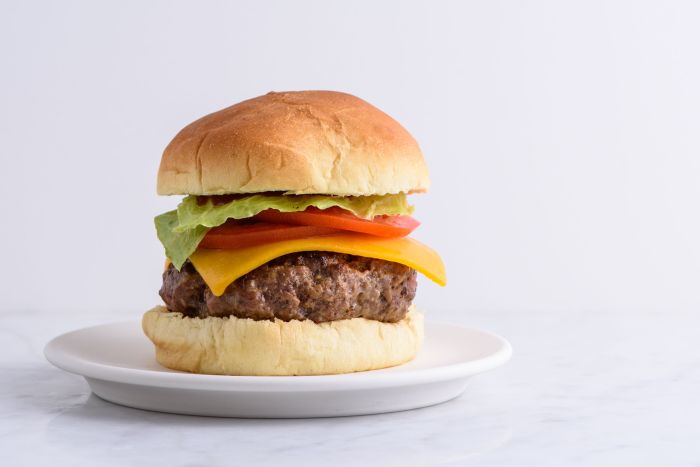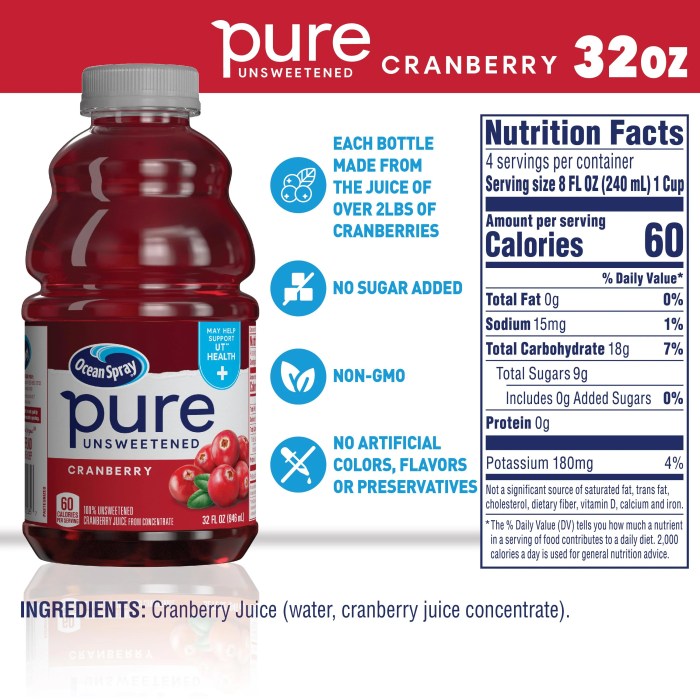Nutritional Composition of a Cheeseburger

Cheese burger nutrition facts – A cheeseburger, a beloved fast-food staple, offers a complex nutritional profile that varies significantly depending on the size, ingredients, and preparation method. Understanding this profile is key to making informed dietary choices. This section details the macronutrient and micronutrient content of a typical cheeseburger, exploring the influence of different cheese types.
Macronutrient Breakdown in a Cheeseburger
The macronutrient composition of a cheeseburger primarily consists of protein, carbohydrates, and fats. Protein comes mainly from the beef patty, while carbohydrates are derived from the bun. Fats are contributed by the beef, cheese, and any added condiments. The exact amounts vary widely. A standard cheeseburger (approximately 150-200g) might contain between 25-40g of protein, 20-40g of carbohydrates, and 20-40g of fat.
These ranges reflect variations in patty size, bun type, and cheese selection. For example, a larger burger with a brioche bun will have a higher carbohydrate count than a smaller one with a whole-wheat bun. Similarly, using a higher-fat cheese will increase the overall fat content.
Understanding the nutritional profile of a cheeseburger, often high in saturated fat and sodium, requires a comparative perspective. For instance, examining the sugar content alone reveals stark differences; a quick look at the nutrition facts 3 musketeers candy bar highlights the concentrated sweetness often absent in the savory cheeseburger, but both contribute to overall daily caloric intake and should be considered within a balanced diet.
Ultimately, responsible consumption of both necessitates mindful awareness of nutritional values.
Micronutrient Content of a Cheeseburger
While not a primary source of micronutrients, a cheeseburger does contribute some vitamins and minerals. Significant amounts of Vitamin B12 (from the beef) and riboflavin (from the cheese) are commonly found. The beef also provides iron, zinc, and selenium. The type of cheese used influences the micronutrient profile; cheddar, for example, is a good source of calcium.
However, the overall micronutrient contribution of a cheeseburger is generally considered relatively low compared to other food sources like fruits and vegetables. It’s crucial to remember that the nutritional value is significantly affected by the quality of ingredients used.
Impact of Different Cheese Types on Nutritional Profile
The type of cheese used dramatically affects a cheeseburger’s nutritional profile, particularly its fat and calcium content. Cheddar cheese, known for its sharp flavor, tends to be higher in fat and calories than Swiss or mozzarella. Swiss cheese, with its characteristic holes, is typically lower in fat and calories than cheddar, offering a slightly milder flavor. Mozzarella, a softer cheese, sits somewhere in between, offering a relatively lower fat content compared to cheddar but higher than Swiss.
The choice of cheese influences not only the calorie count but also the vitamin and mineral content; for instance, cheddar provides more calcium than Swiss cheese.
Nutritional Information Comparison Table
| Cheese Type | Protein (g) | Carbohydrates (g) | Fat (g) | Calories (approx.) |
|---|---|---|---|---|
| Cheddar | 30-35 | 30-35 | 35-45 | 500-600 |
| Swiss | 28-33 | 28-33 | 25-35 | 450-550 |
| Mozzarella | 29-34 | 29-34 | 30-40 | 480-580 |
| No Cheese | 25-30 | 25-30 | 20-30 | 400-500 |
Calorie Content and its Variability: Cheese Burger Nutrition Facts

The calorie count of a cheeseburger is surprisingly dynamic, fluctuating wildly depending on seemingly minor variations in its construction. Understanding these factors is key to making informed choices about this popular fast-food staple. A seemingly simple meal can harbor a wide range of caloric content, influenced by factors beyond just the patty itself.The calorie count of a cheeseburger is directly proportional to its size and ingredients.
A larger patty naturally contributes more calories than a smaller one. The type of bun also plays a significant role; a brioche bun, for instance, will add considerably more calories than a whole-wheat option. Added toppings such as bacon, cheese, and creamy sauces significantly inflate the calorie count. Even seemingly innocuous additions like lettuce and tomato contribute a small but measurable amount.
Cheeseburger Calorie Comparison
A standard cheeseburger from a fast-food chain might contain anywhere from 300 to 500 calories. However, this number can easily double or even triple depending on the size and customizations. For example, a double cheeseburger with bacon and extra cheese could easily surpass 800 calories. In comparison, a simple salad with grilled chicken might contain around 350 calories, while a large portion of pasta with creamy sauce could exceed 700.
This highlights how a cheeseburger, depending on its composition, can easily rival, or even exceed, the calorie content of other popular meal options.
Cooking Method Impact on Calorie Content
The cooking method used also impacts the final calorie count. A cheeseburger cooked on a griddle, where excess fat can drip away, will generally have a lower calorie count than one deep-fried, where the patty absorbs more oil. Grilling, while adding some char and flavor, typically results in a slightly lower calorie count compared to frying, although the difference might not always be substantial.
The type of oil used in frying also matters; oils with higher saturated fat content will increase the overall calorie count.
Calorie Ranges for Cheeseburger Customizations
Understanding the impact of customization is crucial for calorie control. The following table illustrates the approximate calorie ranges for various cheeseburger options:
- Basic Cheeseburger (small patty, simple bun): 300-400 calories
- Standard Cheeseburger (medium patty, standard bun): 400-500 calories
- Deluxe Cheeseburger (large patty, brioche bun, bacon, extra cheese): 700-900 calories
- Cheeseburger with additional toppings (e.g., onions, pickles, mayonnaise): +50-100 calories per topping (approximate)
These ranges are approximate and can vary significantly depending on the specific ingredients and preparation methods used by different restaurants. It’s always best to check the nutritional information provided by the restaurant itself for the most accurate calorie count.
Impact of Ingredients on Nutritional Value

The nutritional profile of a cheeseburger is a complex tapestry woven from its individual components. Understanding the nutritional contributions of each ingredient—from the beef patty to the condiments—is crucial for making informed choices about this popular meal. Let’s delve into the specifics, examining both the potential benefits and drawbacks of each element.
Nutritional Breakdown of Cheeseburger Components
The classic cheeseburger boasts a quartet of key players: the beef patty, the bun, the cheese, and the condiments. Each contributes significantly to the overall nutritional value, often in contrasting ways. The beef patty provides protein and iron, essential for building and maintaining tissues and carrying oxygen throughout the body. However, it can also be high in saturated fat, potentially contributing to elevated cholesterol levels.
The bun, typically made from refined grains, offers carbohydrates for energy but is often low in fiber and other essential nutrients. Cheese, a source of calcium and protein, adds richness and flavor, but also contributes significantly to the overall fat and sodium content. Finally, condiments like ketchup, mustard, and mayonnaise can add flavor but also contribute to the sodium and sugar content.
Health Benefits and Drawbacks of Cheeseburger Ingredients
Several ingredients within a cheeseburger offer potential health benefits, while others present potential drawbacks. Lean beef patties, for instance, can be a good source of protein and iron, essential for muscle growth and overall health. However, the high saturated fat content in many beef patties needs careful consideration, particularly for individuals with high cholesterol. Choosing a whole-wheat bun over a refined-grain bun increases the fiber content, promoting better digestion and blood sugar control.
Similarly, opting for low-fat cheese reduces the overall fat and calorie content. Finally, using condiments sparingly minimizes added sodium and sugar intake.
Role of Added Fats and Sodium, Cheese burger nutrition facts
Added fats and sodium are significant contributors to the overall nutritional profile of a cheeseburger. Saturated and trans fats, found predominantly in the beef patty and cheese, can raise LDL (“bad”) cholesterol levels, increasing the risk of heart disease. Sodium, often found in abundance in processed meats, cheese, and condiments, contributes to high blood pressure, a risk factor for stroke and heart disease.
Therefore, choosing leaner meats, low-fat cheese, and using condiments sparingly can significantly reduce the intake of these potentially harmful substances. For example, a cheeseburger made with a lean turkey patty instead of a beef patty can substantially lower the saturated fat content.
Nutritional Comparison of Cheeseburgers with Different Meat Types
The nutritional value of a cheeseburger varies considerably depending on the type of meat used. A beef cheeseburger, while flavorful, tends to be higher in saturated fat and cholesterol compared to a turkey or veggie burger. A turkey cheeseburger offers a leaner protein source with lower saturated fat and cholesterol but may be lower in iron. A vegetarian cheeseburger, made with plant-based patties, provides a good source of protein and fiber, but the nutritional profile can vary significantly depending on the specific ingredients used.
For instance, a veggie burger made with beans and vegetables will have a different nutritional profile compared to one made with processed ingredients and added fats. Consider the following simplified comparison (values are estimates and vary based on specific brands and preparation methods):
| Cheeseburger Type | Calories (approx.) | Fat (g, approx.) | Protein (g, approx.) | Sodium (mg, approx.) |
|---|---|---|---|---|
| Beef | 350-450 | 20-30 | 25-35 | 800-1200 |
| Turkey | 300-400 | 15-25 | 20-30 | 700-1000 |
| Veggie | 250-350 | 10-20 | 15-25 | 600-900 |
FAQ Corner
What are the best cheese options for a healthier cheeseburger?
Lower-fat cheeses like Swiss or part-skim mozzarella offer a better nutritional profile compared to high-fat options like cheddar.
Can I make a cheeseburger healthier?
Yes! Opt for a whole-wheat bun, leaner beef, add plenty of vegetables, and use lighter condiments. Consider grilling instead of frying.
How many calories are in a typical cheeseburger?
Calorie counts vary greatly depending on size and ingredients, ranging from approximately 300 to over 1000 calories.
Are there vegetarian/vegan cheeseburger options?
Yes, many restaurants and home cooks offer delicious vegetarian and vegan cheeseburger alternatives using plant-based patties and cheese substitutes.








